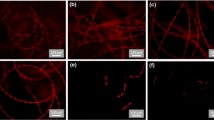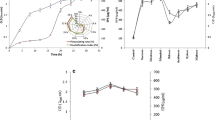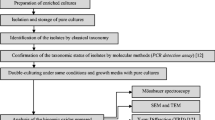Abstract
A strain of Klebsiella oxytoca, isolated from acid pyrite-mine drainage, characteristically produces a ferric hydrogel, consisting of branched heptasaccharide repeating units exopolysaccharide (EPS), with metal content of 36 wt%. The high content of iron in the EPS matrix cannot be explained by a simple ferric ion bond to the sugar skeleton. The bio-generated Fe–EPS is investigated by X-ray absorption spectroscopy. Fe K-edge XANES analysis shows that iron is mostly in trivalent form, with a non-negligible amount of Fe2+ in the structure. The Fe EXAFS results indicate that iron in the sample is in a mineralized form, prevalently in the form of nano-sized particles of iron oxides/hydroxides, most probably a mixture of different nano-crystalline forms. TEM shows that these nanoparticles are located in the interior of the EPS matrix, as in ferritin. The strain produces Fe–EPS to modulate Fe-ions uptake from the cytoplasm to avoid iron toxicity under anaerobic conditions. This microbial material is potentially applicable as iron regulator.





Similar content being viewed by others
References
Arčon I, Mozetič M, Kodre A (2005) XAS study of oxygen-plasma treated micronised iron-oxide pigments. Vacuum 80:178–183
Arčon I, Kolar J, Kodre A, Hanžel D, Strlič M (2007) XANES analysis of Fe valence in iron gall inks. X-Ray Spectrom 36:199–205
Baldi F, Minacci A, Pepi M, Scozzafava A (2001) Gel sequestration of heavy metals by Klebsiella oxytoca isolated from iron mat. FEMS Microbiol Ecol 36:169–174
Baldi F, Marchetto D, Battistel D, Daniele S, Faleri C, De Castro C, Lanzetta R (2009) Iron-binding characterization and polysaccharide production by Klebsiella oxytoca strain isolated from mine acid drainage. J Appl Microbiol 107:1241–1250
Baldi F, Marchetto D, Zanchettin D, Sartorato E, Paganelli S, Piccolo O (2010) A bio-generated Fe(III)-binding exopolysaccharide used as new catalyst for phenol hydroxylation. Green Chem 12:1405–1409
Coe EM, Bowen LH, Speer JA, Wang Z, Sayers DE, Bereman RD (1995) The recharacterization of a polysaccharide iron complex (Niferex). J Inorg Biochem 58:269–278
Dominko R, Sirisopanaporn C, Masquelier C, Hanzel D, Arčon I, Gaberscek M (2010) On the origin of the electrochemical capacity of Li2Fe0.8Mn0.2SiO4. J Electrochem Soc 157:A1309–A1316
Küzma M, Dominko R, Hanzel D, Kodre A, Arčon I, Meden A, Gaberscek M (2009) Detailed in situ investigation of the electrochemical processes in Li2FeTiO4 cathodes. J Electrochem Soc 156:A809–A816
Leone S, De Castro C, Parrilli M, Baldi F, Lanzetta R (2007) Structure of the iron-binding exopolysaccharide produced anaerobically by the gram-negative bacterium Klebsiella oxytoca BAS-10. Eur J Org Chem 31:5183–5189
Ravel B, Newville M (2005) ATHENA, ARTEMIS, HEPHAESTUS: data analysis for X-ray absorption spectroscopy using IFEFFIT. J Synchrotron Radiat 12:537–541
Rehr JJ, Albers RC, Zabinsky SI (1992) High-order multiple-scattering calculations of x-ray-absorption fine structure. Phys Rev Lett 69:3397–3400
Watt RK (2011) The many faces of the octahedral ferritin protein. Biometals 24:489–500
Wong J, Lytle FW, Messmer RP, Maylotte DH (1984) K-edge absorption spectra of selected vanadium compounds. Phys Rev B 30:5596–5610
Acknowledgments
This research was supported by the Slovenian Research Agency (P1-0112). Access to synchrotron radiation facilities of ELETTRA (beamline XAFS) is acknowledged. Giuliana Aquilanti and Luca Olivi of ELETTRA are acknowledged for expert advice on beamline operation.
Author information
Authors and Affiliations
Corresponding author
Rights and permissions
About this article
Cite this article
Arčon, I., Piccolo, O., Paganelli, S. et al. XAS analysis of a nanostructured iron polysaccharide produced anaerobically by a strain of Klebsiella oxytoca . Biometals 25, 875–881 (2012). https://doi.org/10.1007/s10534-012-9554-6
Received:
Accepted:
Published:
Issue Date:
DOI: https://doi.org/10.1007/s10534-012-9554-6




